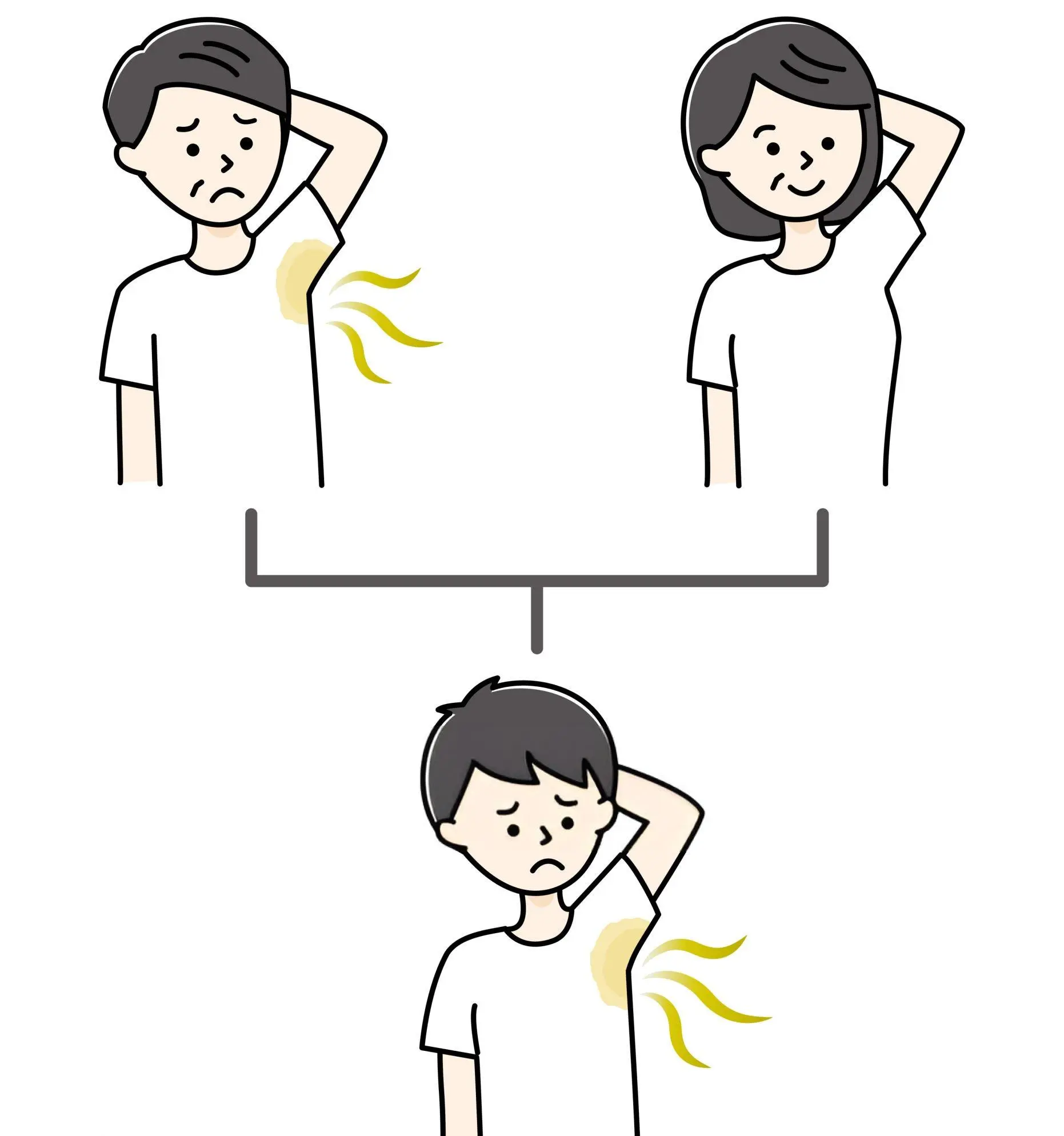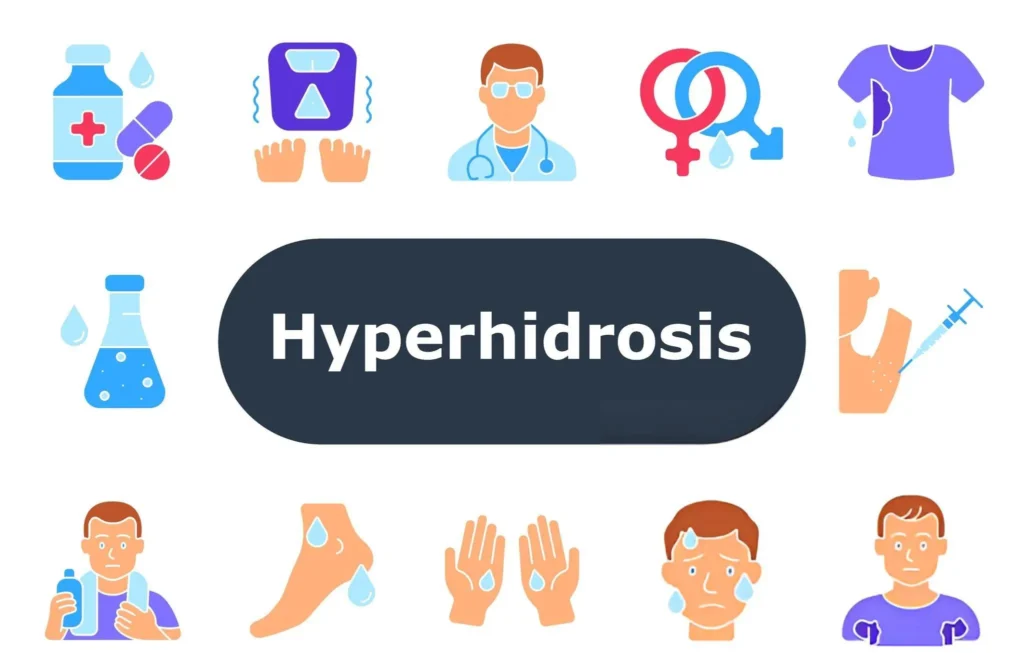Is Hyperhidrosis Genetic? Understanding the Role of Family History
You sweat through your shirt during important meetings. Your hands drip during handshakes. Your feet soak through socks daily. If this sounds familiar, you are probably wondering: Is hyperhidrosis genetic?
Research suggests that primary hyperhidrosis often runs in families, though genetics is not the only factor. But genetics isn’t the whole story. Understanding how family history affects your sweat glands can help you make better treatment decisions.
If you are struggling with excessive sweating in NSW, including Newcastle, Central Coast, and nearby suburbs, know that management options are available for excessive sweating. Skinduced Aesthetic Clinic provides consultations to assess hyperhidrosis and discuss appropriate management options.
What Makes Hyperhidrosis Run in Families?
Is hyperhidrosis genetic? Research shows that primary hyperhidrosis has strong family connections. Studies suggest that a significant proportion of people with primary hyperhidrosis have a family history of the condition with excessive sweating have relatives who deal with the same condition.
Your sweat glands inherit certain traits from your parents. These traits control how much you sweat and when your body triggers sweating responses. If your mom’s hands always felt damp or your dad changed shirts twice daily, there’s a good chance you inherited similar sweat gland activity.
Scientists haven’t found a single “sweating gene” yet. Instead, multiple genes work together to control your body’s cooling system. This explains why hyperhidrosis affects different family members in various ways.
Also Read: https://skinduced.com.au/what-is-hyperhidrosis-treatment/
Primary vs Secondary Hyperhidrosis: The Genetic Difference
Not all excessive sweating comes from your DNA. Understanding the difference between primary and secondary hyperhidrosis helps answer whether your sweating is genetic.
Primary Hyperhidrosis: This medical condition usually starts in childhood or teenage years. It affects specific body areas like palms, underarms, face, or feet. Primary hyperhidrosis shows strong genetic patterns, if your parents had it, your risk may be higher.
Key features of primary hyperhidrosis:
- Starts before age 25
- Affects both sides of your body equally
- Stops during sleep
- Happens at least once per week
- Has family history connections
Secondary Hyperhidrosis: This type develops from other medical conditions, medications, or hormonal changes. Secondary hyperhidrosis is not genetic it’s your body response to something else happening.
Common causes include:
- Menopause
- Diabetes
- Thyroid problems
- Certain medications
- Infections
How Family History Affects Different Body Areas
Is palmar hyperhidrosis genetic? Yes, and so are other focal types. Different sweating patterns show varying levels of family inheritance.
Hand Sweating (Palmar Hyperhidrosis): Hand sweating has the strongest genetic links. If one parent has sweaty palms, the likelihood increases when one parent is affected, and is higher when both parents have symptoms.
Underarm Sweating: Armpit sweating also runs in families, though not as strongly as hand sweating. Many people with underarm hyperhidrosis report relatives with similar problems.
Foot Sweating: Sweaty feet often accompany hand sweating in families. People with hyperhidrosis who affect both areas usually have stronger genetic components.
Facial Sweating: Face and head sweating show family patterns too, though it’s less common than other types.
The Science Behind Inherited Sweating
Your sweat glands receive signals from your nervous system. Genes control how sensitive these signals are and how quickly your glands respond.
People with hyperhidrosis have overactive sympathetic nervous systems. This system controls automatic body functions like heart rate, breathing, and sweating. When genes make this system too sensitive, normal triggers cause excessive sweating.
Temperature, stress, spicy foods, and anxiety disorder symptoms can all trigger sweating responses. In people with genetic hyperhidrosis, these triggers cause much stronger reactions than normal. While genetics plays a role, treatment options work regardless of family history. Medical treatments may help reduce excessive sweating in many individuals, whether you inherited it or developed it later.
Environmental Factors That Influence Genetic Sweating
Even when hyperhidrosis runs true in your family, the environment affects how severely symptoms appear.
Climate and Location: Living in humid climates may worsen symptoms in people with a genetic predisposition. The combination of heat and humidity challenges your body’s cooling system more than dry climates.
Stress Levels: Work pressure, social anxiety, and daily stress amplify genetic sweating patterns. Many people notice their symptoms worsen during exam periods, job interviews, or social situations.
Diet and Lifestyle: Spicy foods, caffeine, and alcohol can trigger sweating episodes in people with a genetic predisposition. Regular exercise might help some people manage symptoms better.
Clothing Choices: Synthetic fabrics trap moisture and heat, making genetic sweating more noticeable. Natural fabrics like cotton allow better air circulation.
When Genetics Isn’t the Cause
Sometimes, excessive sweating starts suddenly in adulthood without a family history. This usually indicates secondary hyperhidrosis rather than genetic causes.
Signs your sweating might not be genetic:
- Started after age 30
- Affects your whole body rather than specific areas
- Continues during sleep
- Accompanied by other symptoms like weight loss or fever
- Began after starting new medications
Secondary hyperhidrosis needs different treatment approaches. Your doctor must address the underlying cause rather than just treating the sweating symptoms.
Treatment Options Work Despite Family History
Whether your excessive sweating is genetic or not, modern hyperhidrosis treatment doesn’t depend on changing your DNA – it works with your body’s current systems.
Non-Surgical Treatments
- Prescription antiperspirants with stronger aluminium compounds
- Botox injections for the underarms, hands, and face
- Iontophoresis machines that use electrical currents
- Oral medications that reduce overall sweating
Advanced Treatment Options
- Endoscopic thoracic sympathectomy for severe cases
- Sweat gland removal procedures
- Newer energy-based treatments
Management options are available and may be effective regardless of whether hyperhidrosis is inherited or acquired your condition or developed it from other causes. The key is finding the right approach for your specific situation and body areas affected.
Living with Genetic Hyperhidrosis
Having genetic hyperhidrosis doesn’t mean you’re stuck with constant sweating forever. People across Sydney manage their symptoms successfully with proper treatment and lifestyle adjustments.
Quality of Life Improvements: Effective treatment helps people:
- Feel confident during handshakes and social interactions
- Wear dark colours without worry about sweat marks
- Participate in activities without embarrassment
- Focus on work instead of managing sweat
Social and Professional Benefits: When excessive sweating gets under control, treatment may support improvements in daily functioning for some individuals.
- Better job interview performance
- More comfortable dating experiences
- Reduced anxiety disorder symptoms
- Improved self-esteem
Long-term Management: Most treatments require ongoing maintenance, but results can last months. Botox treatments typically provide 6-12 months of relief. Other options offer different timeframes and effectiveness levels.
Also Read: https://skinduced.com.au/8-easy-tips-to-collagen-restore-in-the-face/
The Role of Early Intervention
If hyperhidrosis runs in your family and you notice symptoms starting, early assessment may support earlier symptom management and reduce the impact on daily life than waiting.
Young people often develop coping strategies that actually make social anxiety worse. They avoid handshakes, wear only dark clothes, or limit activities. These behaviours can become habits that persist even after treatment.
Starting treatment early:
- Social withdrawal patterns
- Work performance anxiety
- Relationship difficulties
- Body odour concerns from bacterial growth
- Skin infection risks from constant moisture
Finding the Right Treatment in NSW
Family history influences your hyperhidrosis risk, but it doesn’t determine your treatment success. NSW clinics offer various approaches based on your specific needs and symptom patterns.
Consultation Process: A proper evaluation includes:
- Family history assessment
- Symptom pattern review
- Physical examination
- Discussion of treatment goals
- Review of previous treatments tried
Personalised Treatment Plans. Effective clinics create individual approaches rather than one-size-fits-all solutions. Your genetic background, lifestyle, and preferences all matter in treatment selection.
Follow-up and Adjustments. Good treatment relationships include ongoing support and adjustments as needed. Bodies change, and treatments may need modifications over time.
Breaking the Cycle for Future Generations
While you can’t change your genetics, understanding family patterns helps you make better decisions for your children.
If you have hyperhidrosis and plan to have children, know that:
- Early recognition helps with faster treatment
- Treatment options are available and continue to evolve
- Social support and understanding prevent psychological impacts
- Treatment technology continues to improve
Common Myths About Genetic Sweating
Myth: “If it’s genetic, nothing can help”
Truth: Genetic hyperhidrosis responds well to treatment regardless of family history.
Myth: “You’ll definitely pass it to your children”
Truth: Genetics increases risk but doesn’t guarantee your children will have hyperhidrosis.
Myth: “Natural remedies work better for genetic types”
Truth: Medical treatments typically provide more reliable results than home remedies.
Myth: “It gets worse with age”
Truth: Many people find symptoms stabilise or even improve with proper management.
The Bottom Line on Genetic Hyperhidrosis
So, is hyperhidrosis genetic? Yes, primary hyperhidrosis often runs in families through multiple gene interactions. But having genetic hyperhidrosis doesn’t mean you have to live with constant sweating.
Modern treatments can effectively manage hyperhidrosis, no matter if it runs in your family or not. With the right evaluation and tailored options, you can take control instead of letting excessive sweating disrupt your daily life. Paying attention to early signs in yourself or your children can also lead to better outcomes and help prevent social or professional challenges.
If excessive sweating is affecting your confidence, professional support is available. Clinics in NSW provide safe, confidential consultations and proven treatments designed to work with your body. Whether your hyperhidrosis is genetic or not, you don’t have to manage it alone. Specialist care can help you regain comfort and confidence.
If excessive sweating is affecting your daily life, professional assessment is available. Clinics across NSW, including Skinduced Aesthetics Clinic in Newcastle, offer consultations to assess hyperhidrosis and discuss suitable management options.
FAQ’s:
Q1. Is hyperhidrosis genetic?
Yes, hyperhidrosis can run in families, but not everyone with a family history will develop it. Both genetic and non-genetic factors can play a role.
Q2. Can children inherit hyperhidrosis from parents?
Children may inherit the tendency for hyperhidrosis if it runs in the family. Early monitoring and professional advice can help manage symptoms effectively.
Q3. Does having a family history mean I will definitely have hyperhidrosis?
No. A family history increases the likelihood but does not guarantee the condition. Lifestyle, health, and other triggers may also contribute.
Q4. How do I know if my excessive sweating is genetic?
If multiple family members experience excessive sweating in similar areas (underarms, hands, feet, face), genetics may be involved. A professional evaluation can confirm.
Q5. What treatments work for genetic hyperhidrosis?
Treatments like botulinum toxin injections, iontophoresis, prescription medication, and lifestyle changes work effectively whether hyperhidrosis is genetic or not.
Q6. Can hyperhidrosis get worse if left untreated?
Yes, without treatment it may lead to social, emotional, or professional difficulties. Early assessment may support earlier symptom management.
Q7. Where can I get hyperhidrosis treatment in NSW?
You can get hyperhidrosis treatment at clinics across NSW, including Skinduced Aesthetics Clinic in Newcastle, which offers safe and confidential consultations with proven treatments. Our team also serves patients from NSW and nearby suburbs.



